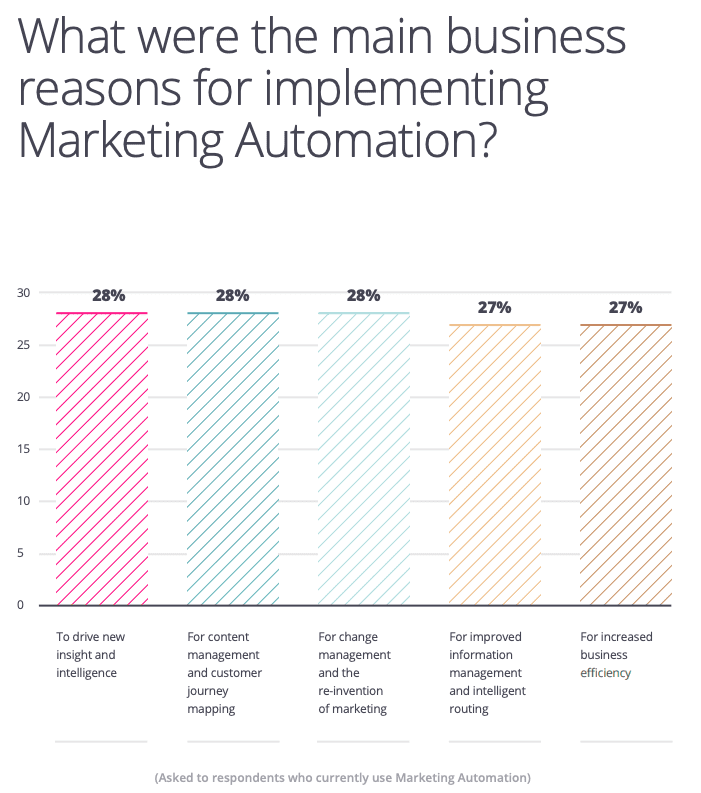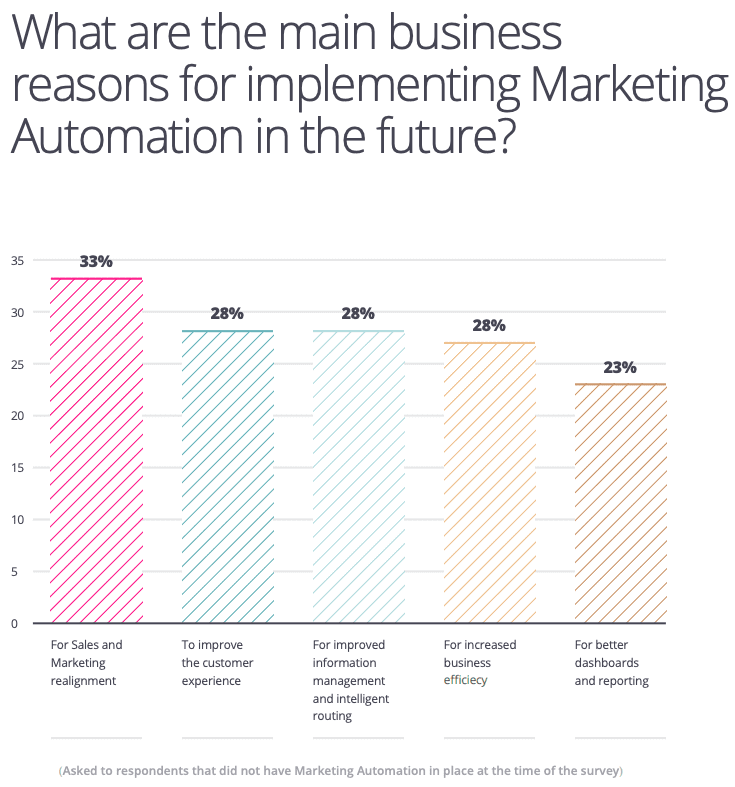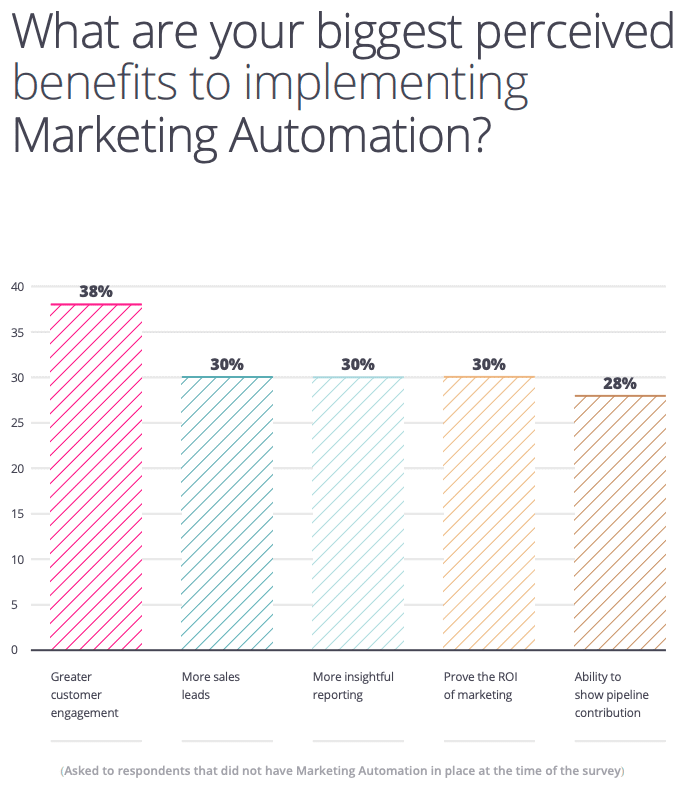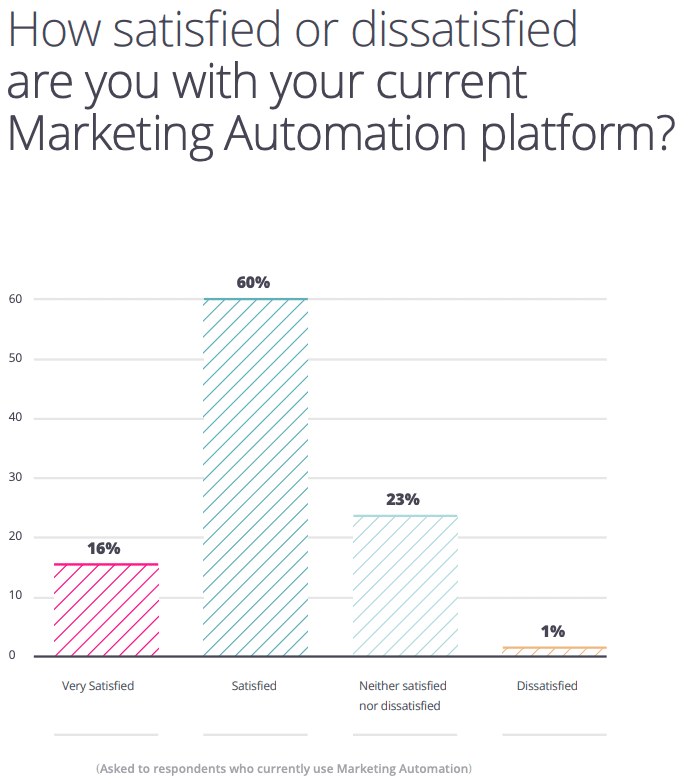Chart of the Week: 28% of businesses are putting marketing automation in place in a bid to drive new intelligence
Businesses are implementing marketing automation in an effort to drive new insight. A global survey by CleverTouch asked marketers the main business reasons for the adoption of marketing with the ability to drive new intelligence coming out top, with 28% of respondents selecting this reason.
Joint with this reason was also content management and customer journey mapping, as well as change management and the re-invention of marketing. These reasons were also each selected by 28% of respondents, showing that there are many benefits offered by the various types of marketing automation available.

Other business reasons for the adoption of this type of technology were improved information management and intelligent routing (27%) and increased business efficiency (27%).
While there is no real winner in terms of why businesses implement marketing technology, people are looking to it to solve a number of challenges across their businesses. It is also widely being used in departments other than marketing, showing that investment in marketing automation is worthwhile, especially as it can improve efficiency across a business as a whole.

Future automation implementation
Out of those who don’t yet have marketing automation in place, the main reason for implementing it in the future was for sales and marketing realignment, which was selected by a third (33%) of respondents.
Other popular reasons to use the technology in the future were to improve the customer experience, for improved information management and intelligent routing, and for increased business efficiency, with each of these options being selected by 28% of respondents. Just 23% said they would look at marketing automation in the future in order to provide better dashboards and reporting.
While sales and marketing realignment is seen as the main reason for those looking at marketing automation as a future investment, those who already use the technology see this as the least important benefit. It is likely that this is due to the perception of marketing automation being different from how it is actually used within a business.
In terms of location, the survey found that companies in the US are four times more likely to use marketing automation in order to drive sales and marketing alignment compared to the EMEA. Some 60% of US respondents were looking at this benefit of the technology while only 15% of EMEA respondents were doing the same.
This suggests that the UK use marketing automation to improve business efficiency, whereas the US see it as a tool primarily for lead generation and sales enablement.

The benefits of marketing automation
Those who have implemented marketing automation have found that the main benefits of doing so have been the fact they can prove ROI, there has been an increase in sales leads thanks to marketing and that they have improved data quality and compliance. Each of these reasons were selected by 31% of respondents who already have the technology in place.
While generating more leads has been a benefit, only 29% said that marketing automation has improved the quality of sales leads, which could suggest that the increase in leads might not actually have improved sales overall.
Some 27% said that a big benefit is the fact that their sales and marketing teams are now more closely aligned. However, this was the least important reason to implement marketing automation, showing that the unexpected benefits can have a big and positive impact.
Marketing automation was also shown to improve customer engagement, with 27% of respondents saying this is the case. On top of this, 26% said that marketing has been able to provide more insightful reporting, which could only go onto improving engagement further as personas are improved and campaigns can become more tailored. This can also further help align sales and marketing, as well as prove the ROI of any marketing activity.

The perceived benefits
Those without marketing automation predicted that the biggest benefit would be greater customer engagement, with 38% selecting this option. This was followed by more sales leads (30%), more insightful reporting (30%) and proving the ROI of marketing (30%).
Compared to the actual benefits, the only perceived benefit that lines up is generating more sales leads, which came in second for both. The biggest perceived benefit – improved customer engagement – actually came in seventh in terms of actual benefits, which could mean that those expecting it to be a big part of the technology could be disappointed with the results.

While improved engagement may not actually be the main benefit, the fact that marketing automation means they will be able to gather more information about their customers will ensure they are better able to drive engagement.
What these results show is that businesses are often unaware of all the benefits that can be delivered by marketing automation. This can result in choosing the wrong type of technology and under planning, meaning marketing automation may not be used to its full potential or deployed in the right way.

Marketing automation satisfaction
The majority of respondents (76%) currently using marketing automation are happy with the platform they currently have. Some 16% are very satisfied while 60% are satisfied. Comparatively, only 23% said they are neither satisfied or unsatisfied and just 1% are not happy with the current platform they are using.
Again, location seems to have an impact on results, as, within the US, more than three-quarters said they are satisfied with their platform, whereas this was just 50% in EMEA. This could be due to different platforms being available or differences in how marketing automation is deployed and used.
Final thoughts
Understanding the real potential of marketing automation before you implement it could help ensure you are using it the right way, have a thorough understanding of how it can help your business and set the right type of goals.
The slight disconnect between perceived and actual benefits shows that there is plenty of scope for error and misuse, so fully assessing what your business needs are will help you choose the right platform and get the most out of marketing automation.
Overall, the satisfaction levels for this form of technology show that it could very well be worth the time and investment. However, you also need to put the right team in place to set it up, as well as regularly assess your use of marketing automation and see how you could improve your strategy.